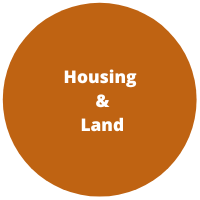
Tahrir Square (Cairo), March 18th. (REUTERS)
The Housing and Land Rights Network (HLRN) of Habitat International Coalition (HIC) is honored to express solidarity and provide is contributions to the revolution in Egypt and the growing call for democracy among many of countries and peoples in the Middle East/North Africa region. The Egyptian Revolution aims at restoring and implementing human rights, particularly economic, social and cultural rights, including the right to adequate housing, which preserve the dignity and ensure the future of citizens in their home and land.
The Egyptian Revolution came about for several reasons, most of them related to violations of Egyptian people’s human rights, as well as the seizing of political and economic power by a few oligarchs and self-interested groups. Their behavior deepened these violations under different pretexts and pretenses, such as development, security and supporting policies biased toward brutal and militarized globalization. This bias and the consequent day-to-day violations embodied a paradox for the majority of people in Egypt: These violations were as flagrant as they were motivating for the people to rise up and struggle eventually to pursue the officials responsible and to implement reparation for victims.
Since establishing its program in the region in 2000, HLRN has worked to support human-rights based development, representing members active in the Arab countries, including the various communities and indigenous peoples who seek self-determination after decades of prejudice practiced by tyrannical rulers. HLRN Members spread over this region rich in struggles of the Nuba in Sudan, Imazighen in North Africa, Kurds in Syria and Turkey, Cypriots subject to transfer and occupation, the Arabs of Ahwaz in Iran, the Palestinian people and others determined to realize liberty and rights in a social state without discrimination against any group or class, and against the exclusion of any citizen from empowerment to attain and sustain of descent life for all in their home and land. So, it is urgent now to emphasis the respect, protection and fulfillment of human rights for all these peoples internal to the state and extraterritorially as well, consistent with regional and international state obligations.
Change is taking place in Tunisia and Egypt. Its reflection appears in Yemen, Bahrain and Libya, a situation that makes it incumbent on us to salute the martyrs and express our practical solidarity with all those peoples who seek justice, liberty and equity. Today we can dedicate ourselves as HLRN Members in the region, and emphasize the values of collective action and social sense which appears in need and predicament in the form of solidarity and social production, as we saw in the popular committees and solidarity for developing the policies in the near future.
The role of HLRN Members in this historic change is represented in the knowledge they have accumulated through civic and social education in human rights principles and methods of mobilization, demanding, as well as actively achieving these rights. The current changes undoubtedly impose a bigger challenge upon us to contribute to solutions and alternatives to eliminate the lingering problems of deprivation and discrimination. So, we, the HLRN Members, redouble our hope and efforts to support the peoples in region also to advance the public good and realize their basic rights and liberties, as well as toppling tyrannical forces that deny them.
At this occasion, we assert a indivisible demands that spring from a keen will to preserve the values that guide change and future decision makers to uphold the public good of citizens without discrimination, exclusion, or deprivation of rights. Most of the following demands already were raised as recommendations by the participants of the Regional Land Forum, which HLRN officers and members organized in October 2010:
1. The decision makers in Egypt announced during the transitional period to freeze any plans that violate citizens’ rights and/or deprive them of livelihood and means of economic and social empowerment in the name of development or progress. Such a plan is the Greater Cairo 2050 Development Plan, which the previous government declared and promoted with the purpose and effect of evicting and dispossessing thousands of victims, most of whom belong to the already-deprived, marginalized groups and slum dwellers. So, we demand that the interim and future government limit cooperation with the World Bank and other international financial institutions (IFIs), whose policies and agendas often contradict the human rights and interests of the impoverished majority by promoting similarly cruel neoliberal policies that deepen the impoverishment and humiliation of vulnerable people. In this context and in a very practical sense, the people most affected must realize their right to participate in all development plans, as well as the formation of proper housing policies.
2. The eviction of peasants must stop from their homes and all types of agrarian lands, including squatted lands, particularly those plots in desert areas. Their expulsion frequently has been violent and contradict their human rights, even when carried out according to local codes.
3. The state and its agents must stop depriving farmers of the rights that they gained in prior periods, and stop implementing the new laws that legalize the derogation of those rights.
4. The new state must allow the evicted people to restore the earnings that were taken from them and return them to their lands, as a rule, or compensate them fairly, as an exception.
5. The state must prevent the use of agricultural lands for purposes other than genuine public purpose projects that serve the public, in general, and explicitly peasants, in particular;
6. Restore the agricultural lands that have been seized by influential officials due to administrative corruption, whether for agriculture or housing, and reconsidering all the contracts made, especially those made in the context of allocation of lands based on narrow interests without genuine public purpose;
7. Formulate housing policies and plans with special priority to providing for the lowest-income segments of society;
8. Curb the increase in prices of agricultural produce, supplies and inputs, agricultural leases and interest on agricultural loans, and start supporting fair prices for agricultural crops based on real costs and the livelihood needs of the poor peasants and micro-farmers;
9. Cease and desist from the deprivation of poor peasants and micro-farmers by excluding them from the Union of Agricultural Workers, including by suspending the procedural changes to their legal and professional status as peasants, and return the displaced peasants to their original status;
10. Reform the legal and operational status of agricultural credit banks into cooperative banks, where interest rates do not exceed 5% annually, returning the agricultural associations’ capital seized by banks and regulate bank interventions into agricultural activities;
11. Stop pursuing peasants in the courts for having defaulted on their agricultural bank debt repayments; immediately release those who are imprisoned for this reason; relieve the debts of poor peasants and micro-farmers; recover the outstanding debt from the sale of crops, instead of by selling the land; limit the services of agricultural associations to actual peasants, registering their names as the owners; and ban the use of pesticides that pollute the environment and pose risks to the health of human and animal populations;
12. Suspend the sale of irrigation water to poor peasants and micro-farmers, and include an article on the human right to water in the Egyptian Constitution and other constitutions in the region. Consequently, the authorities have to give up the idea and projects of privatization of public goods, facilities and services, as the state is obligated to ensure equitable provision of these goods and services as one of the elements of the right to adequate housing, the right to health and the right to food, among other rights;
13. Review water-related polices, regulations and treaties, and promote legislation that harmonizes with the human rights instruments that the state ratified;
14. Remove all restrictions preventing peasants from establishing leagues, unions, syndicates and political organizations protecting and unifying them in the pursuit of their interests;
15. Support the rights of rural women working in agriculture, and emphasize the importance of giving those women their fair share of inheritance in land, and remove all the restrictions that impede women attaining their rights to land and housing;
16. Reconsider the condition of agricultural labor, ensuring that agricultural workers, together with peasants who have been evicted from their lands, are the first to benefit from reclaimed lands; and provide the agricultural workers with an environment meeting humane standards and ensure a sustainable living;
17. Lift and resist any restrictions imposed by multinational production, marketing or supply companies depleting the peasantry and its use of indigenous and local seeds, organic fertilizers and limited-technology equipment as appropriate for their agricultural activities;
18. Foster local, regional and international solidarity, since it is one of the significant factors supporting peasants’ rights protection and balancing professional, economic and political powers in their society;
19. Secure the rights of peasants who reclaimed the desert lands, particularly those facing forced eviction from their plots (such as Egypt’s Tusun area, in Alexandria, and Qantara Sharq, in Sinai, among others). Consequently, it is urgent for the people subject to violation that they enjoy their right to reparation.
20. The decision and policy makers of the new regime have to design policies with clear standards and norms for housing, respecting adequate housing as indispensible to a life with dignity. Consequently, it is urgent to amend legislation in order to advance public interests and the citizen’s right to adequate housing;
21. Immediately halt and refrain from any forced eviction, a gross violation of the human right to adequate housing, albeit in the name of development, while perpetuating discrimination and deprivation.
HLRN members and constituents in Egypt greet the challenge to achieve these goals, demands and rights. The coordination office in Cairo will keep Members abreast of developments and progress.
Salute to the people and martyrs of the Egyptian Revolution


